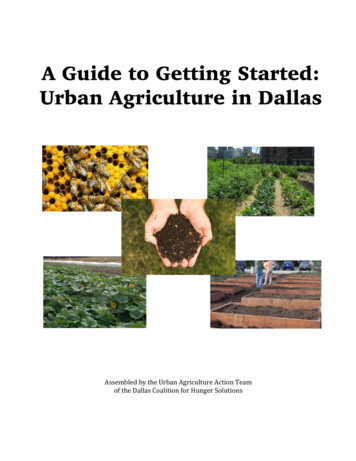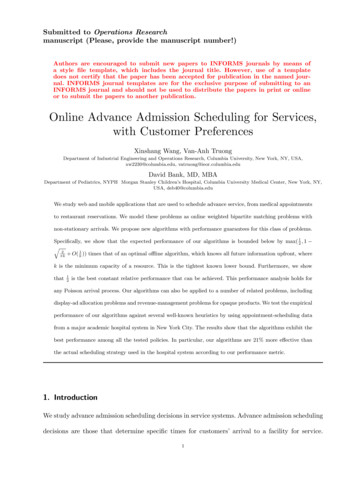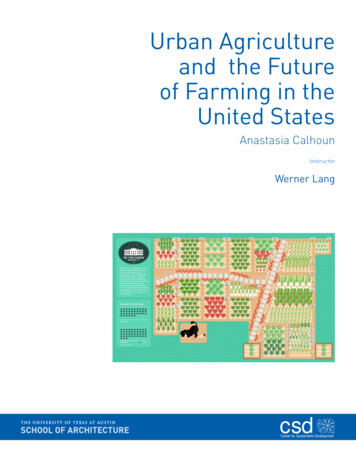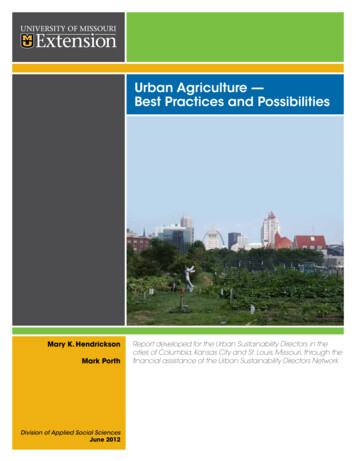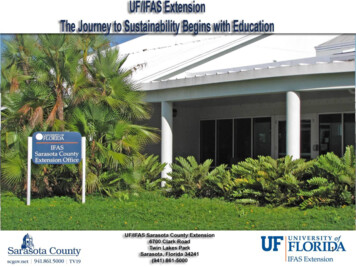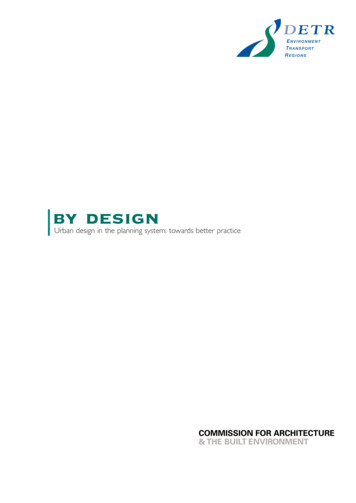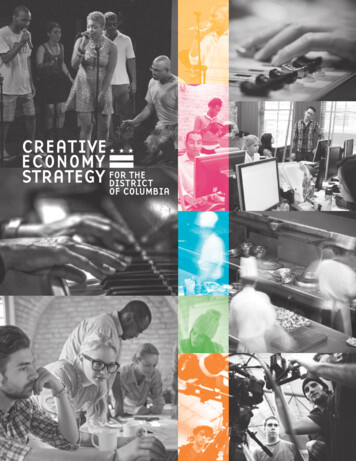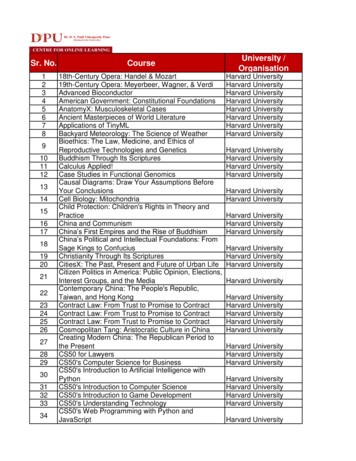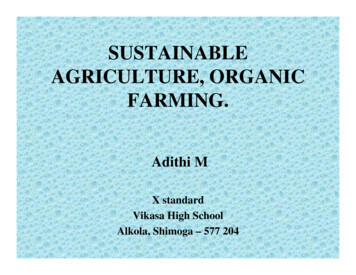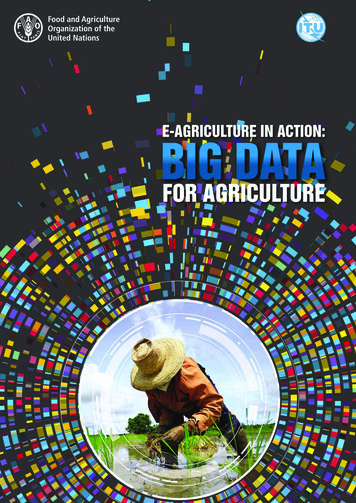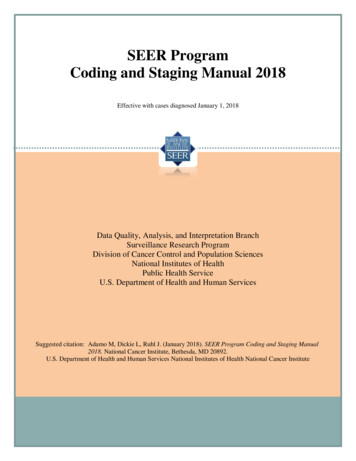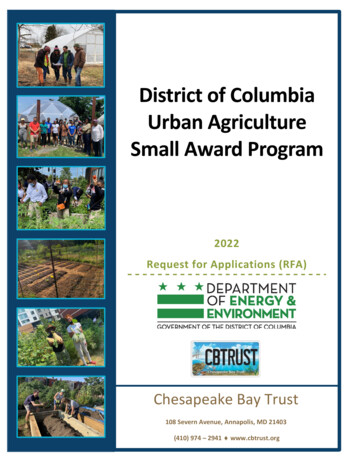
Transcription
District of ColumbiaUrban AgricultureSmall Award Program2022Request for Applications (RFA)Chesapeake Bay Trust108 Severn Avenue, Annapolis, MD 21403(410) 974 – 2941 www.cbtrust.org
District of Columbia Urban Agriculture Small AwardProgramAt A GlanceProgram Summary:The District of Columbia Urban Agriculture SmallAward Program offers funding to increase thecapacity of District farms, particularly for sociallydisadvantaged farmers, through improvedinfrastructure and operations.Table of ContentsIntroduction. 3Program Overview . 3Deadline:May 19, 2022, at 6pm EDTEligible Applicants. 3Eligible Project Types. 4Eligible Project Locations:District of ColumbiaEvaluation Criteria . 4Eligible Applicants:Funding Availability and Timeline . 6Applicants physically located in the District ofColumbia that are Nonprofit organizations; Faithbased organizations; Universities/educationalinstitutions; or Private Enterprises.Deadlines . 6Application Review Process. 6Awards and Notifications . 6Request Amount:Contact . 6Up to 10,000Narrative Questions . 7Funds Available:Budget Instructions . 8Approximately 77,000Online Application Submission Instructions. 10Submit Your Application:https://www.grantrequest.com/SID 1520?SA SNA&FID 35662Appendix 1: DOEE Grant Promises, Certifications,Contact:Appendix 2: DOEE Grant General Terms andAssertions, and Assurances and . 11Carlton Burns, Program Coordinator, 410-9742941 ext. 125 cburns@cbtrust.orgConditions. 202
IntroductionThe Chesapeake Bay Trust (Trust) is a nonprofit, grant-making organization dedicated to improving the bays,streams, rivers, forests, parks, and other natural resources of our local systems, from the Chesapeake to theCoastal Bays to the Youghiogheny River. The Trust, supported in large part by Maryland’s Chesapeake BayLicense Plate and partnerships with other regional funders, engages and empowers diverse groups to takeactions that enrich natural resources and local communities of the Chesapeake Bay region. Since 1985, theTrust has awarded over 130 million in awards to municipalities, nonprofit organizations, schools, and publicagencies throughout the Chesapeake Bay watershed.District of Columbia Department of Energy and Environment (DOEE) awarded the Chesapeake Bay Trust toimplement the 2022 District of Columbia Urban Agriculture Small Award Program. DOEE is the leadingauthority on energy and environmental issues affecting the District of Columbia. DOEE formalized the Office ofUrban Agriculture in 2020 which works to increase food production in the District of Columbia and to support amore sustainable, equitable, and resilient food system. The Office is a central hub working with the DC FoodPolicy Council, sister agencies, the University of the District of Columbia, farmers, and community members tosupport urban agriculture, increase access to fresh, healthy produce, empower communities, and create greenjobs.The source of funds for this award program is the Government of the District of Columbia.Program OverviewDistrict farms are diverse in their form and function, including non-profit, for-profit, in-ground, rooftop, andhydroponic operations. Many of these farms contribute much-needed fresh produce to communitiesexperiencing food insecurity, provide educational opportunities, and act as a valuable community gatheringspace for health and wellness. Despite a growing urban agriculture movement in the District, farmers areunder-resourced, challenged by high land values, lack essential infrastructure, and have difficulty accessingcapital. For socially disadvantaged farmers i, this challenge is compounded by historic disenfranchisement inobtaining access to land and farm funding.Urban farms are defined as any property in the District of Columbia that is used for the growing, cultivating,processing, and distributing of crops for profit, not for profit, or for educational purposes (statute §§ 48-401).The District of Columbia Urban Agriculture Small Award Program seeks to support the success of agricultureinitiatives for socially disadvantaged farmers through the increase of infrastructure and operations, to providefunding to build capacity for crop production and distribution, and to increase knowledge for farmers andDistrict residents through agricultural education experiences.The Trust is committed to the advancement of diversity and inclusion in its award-making and environmentalwork. As a result, the Trust strongly encourages applications directly from underrepresented groups, and forprojects that increase awareness and participation of communities that are traditionally underrepresented,such as communities of color. For a full description of the Trust’s efforts to engage under-engaged groups, seeour strategic plan at www.cbtrust.org/strategic-plan and https://cbtrust.org/diversity-inclusion/.iThe United States Department of Agriculture defines socially disadvantaged farmers (SDFs) as those belonging to groups that have been subject toracial or ethnic prejudice. SDFs include farmers who are Black or African American, American Indian or Alaska Native, Hispanic or Latino, Asian or PacificIslander, and women. (https://bit.ly/3ddTcvx)Eligible ApplicantsDOEE and the Trust welcome requests from the following organizations physically located in the District ofColumbia:3
Nonprofit organizations, including those with IRS 501(c)(3) or 501(c)(4) determinations;Faith-based organizations;Universities/educational institutions; andPrivate Enterprises.The following types of applicants are not eligible: Organizations without a formal legal non-profit or business status, i.e. unincorporated associations Government entities Individual personEligible Project TypesA successful project proposal should produce outcomes that address at least one of the following goals;however, additional points will be awarded for those that address multiple goals:1. Increase food crop production, processing and/or distribution at an urban farm;2. Improve distribution & access to fresh foods for food insecure communities in District Wards 5, 7, & 8;3. Construct facilities that enable agricultural education experiences for District residents;4. Accelerate the business and production capacity for socially disadvantaged farmers; and5. Advance sustainable agricultural efforts in the District.Examples of fundable projects include but are not limited to: Fencing, cold storage, wash/pack stations, sheds, and pavilions for food processing and educationevents Hoop houses, greenhouses, and shipping containers for indoor growing Controlled Environment Agriculture (CEA) Technology, including lighting, hydroponic, and aquaponiccomponents Utility installation to support urban farms, such as water, electrical lines, and solar panels Farm equipment, i.e. tools and irrigation supplies Operational Support, including office equipment, web platforms for program promotion andexpansion, EBT technology, and training associated with use of equipment or platforms.Learn about projects funded in the past here: https://doee.dc.gov/node/1588586A project is NOT eligible if:1. The project is already being funded by another federal or District Government grant or contract.a. Exception: A project funded by another grant or contract IS eligible if the applicant isrequesting additional funding for a proposed project outside of the original scope.2. It uses invasive plant species, herbicides, or pesticides.Continuing conditions of eligibility are that the information in the application is complete and truthful and thatthe Applicant at all times is able to meet any material conditions stated in its application. For instance, if anApplicant’s ability to fulfill the terms of the award is based on the availability of skilled staff or volunteers andthose staff or volunteers should leave after the application’s submittal or the award to the Applicant, theApplicant has the responsibility to advise the Trust in writing of this change in material conditions.Evaluation CriteriaThe following criteria will be used by internal and partner expert reviewers to evaluate applications:4
Scoring CriteriaJustification (ProjectNeed)Likelihood of ProjectSuccessPartnerships andCommunitySustainabilityCost Effectiveness /BudgetDescription of Scoring CriteriaScoringScale of 1 to 25 Does the applicant clearly identify which of the programgoals they will meet and how funding is essential to1-20 baselineadvance their work?with up to 5 Does the proposed project support the broader goals ofadditional pointsthe applicant organization and/or other existingper project areacommunity efforts? Does the proposal effectively(described underdescribe how the project increases the capacity of farms“Eligible Projectin the District, particularly for socially disadvantagedTypes”)farmers, through improved infrastructure andoperations?Scale 1 to 20 Does that applicant provide an understanding of thesteps required to be successful in this project and meetthe outcomes of this program? Has the applicant presented a clear plan for producingproject outputs and achieving project outcomes? Are methodologies consistent with best practices? Does the applicant provide helpful and necessarysupporting documents to allow successful evaluation ofthe application? E.g., site plan or site photos.Scale 1 to 20 Does the applicant describe how it is familiar with Districturban agriculture and its stakeholders? Are any key partnerships required, and if so, are theselected partnerships appropriate? (e.g. previousexperience with work proposed, clear communityconnections, etc.) Does the project propose to work with sociallydisadvantaged communities and/or food insecurecommunities in District Wards 5, 7, & 8? Does the applicant describe the ways in whichcommunity members were involved in the developmentof the project and how the community needs and desireswere assessed? Is it clear that partners are aware of their role and doesthe applicant provide letter(s) of commitment fromproject partners?Scale 1 to 15 Has the applicant addressed future project sustainability(e.g., ongoing resources)? If the application is for a knowledge-building or behaviorchange project, will the impacts of the work be felt afterthe award period has ended? For infrastructure projects, will the project be wellmaintained during and after the award period?Scale 1 to 20 Is the budget appropriate and cost effective? Are the lineitems budgeted justified in the budget narrative?Total Score Possible1005
Funding Availability and TimelineFunding Availability: The funding partners anticipate approximately 77,000 in funding available for this RFA.We anticipate awarding eight to ten awards; applicants can request up to 10,000.Project Timeline: Awards will be announced in June 2022. Projects must be completed by September 2, 2022.Requests to extend deadline to meet award objectives will NOT be considered.DeadlinesApplicants must submit applications in the Chesapeake Bay Trust Online System by 6:00 PM EDT on May 19,2022. Late applications will not be accepted, and the online funding opportunity will close automatically andpromptly at 6 PM EDT. Applicants are strongly encouraged to submit at least a few days prior to the deadlinegiven potential for high website traffic on the due date. The Trust cannot guarantee availability of technicalassistance for our online system on the deadline date.Application Review ProcessAll submitted applications are scored by technical experts in the field supported by this RFP. Reviewers score allapplications based on the evaluation criteria listed in the above “Evaluation Criteria” section.The funding partners reserve the right to fund projects and budget items that advance their mission and meetspecific funding priorities and criteria.Awards and NotificationsThe 2022 District of Columbia Urban Agriculture Small Award Program awards will be announced in June 2022.All applicants will receive a letter stating the funding partnership’s decision. An application may be declined,partially awarded, or fully awarded. If approved, the Trust will send an award agreement with awardconditions and due dates of status, progress, and final reports. The Trust will mail the first award payment tothe requesting organization following satisfaction of any phase 1 payment award contingencies, includingupload of the signed award agreement. Ten percent of the total award will be held until the final report issubmitted and approved. In cases where the awardee fails to submit a status report, progress report, or finalreport by the due date, the Trust reserves the right to terminate the award agreement and require a refund offunds already transferred to the awardee.When the project is complete, awardees are required to complete final reports that may include but are notlimited to submission of all receipts for supplies, invoices for subcontractors/contractors, and copies oftimesheets for personnel time used (timesheets must include date, name, time worked per day, and coding totie the time worked to the award).All financial back-up documentation will be grouped and numbered to correspond to the budget line itemreported as spent. Organizations with outstanding final, progress, or status reports will not be awardedadditional awards.ContactFor technical assistance contact Carlton Burns at (410) 974-2941 x 125 or cburns@cbtrust.org6
Narrative QuestionsYou will upload a MS Word or PDF file not to exceed three (3) pages of text, excluding photos or materials suchas Letter(s) of Commitment, that address the following questions. To ensure that you address all questions,we recommend that you copy and paste the questions and use them as an outline in your narrative.Background and History:1. What is the background of the project?2. What is your experience in this work and why is this project needed?3. How does the project support the broader goals of your organization and advance your work?Project Goal:4. Check each of the program goals your project addresses. You may select more than one.Check hereProgram goals that your project addressesIncrease food crop production, processing, and/or distribution at an urban farmImprove distribution and access to fresh foods for food insecure communities inDistrict Wards 5, 7, & 8Construct facilities that enable agricultural education experiences for DistrictresidentsAccelerate the business and production capacity for socially disadvantagedfarmersAdvance sustainable agricultural efforts in the District5. What will your project do to meet the goals selected above, especially to increase the capacity ofDistrict farms?Outputs and Outcomes:Definitions:i.Output: an immediate result of the work being completed (e.g. the number of people that willattend a workshop focused on the importance of healthy local produce)ii.Outcome: a change that is prompted as a result of an output (e.g.: increased knowledge about thevalue of local foods, and increased feeling of self-efficacy about how to access and purchase localproduce)iii.Timeline: The application must include a proposed timeline for project implementation.6. What are the project outputs? And how will they be achieved?7. What are the project outcomes, and how will those be achieved?Partnerships and Community: Think about the types and groups of people that are most relevant to your goaland are most likely to benefit from your project. Considering the Trust's commitment to the advancement ofdiversity in its award-making in your responses.8. What is the demographic information of the community or population involved in or served by theproject?9. How is your target population and/or community involved in the planning, development, andimplementation of the proposed project, and in the development of this application?The Trust encourages applications directly from under-engaged and/or socially-disadvantagedcommunities. If your organization is not a member of the community served by the award (for7
example, an external non-profit doing work on land owned by another entity, such as a faith-basedorganization)10. How will “ownership” of the project be transferred to the community AND how will the communitycontinue to carry the work forward (development and resources)? (Please write N/A if not applicable)11. What is your organization’s experience working with the specific communities that you will beprioritizing and engaging?11.1. If you have not had significant experience working with or as part of your prioritizeddemographic. How do you intend to address this issue? (Please write N/A if not applicable)The Trust encourages applicants to establish partnerships with local organizations that may havegreater cultural competencies1 within the prioritized demographic(s).12. What are your key partnerships?13. Why were those partnerships selected?14. What makes them the best partners for this work?For projects involving the hiring a consultant, applicants should either (a) have already obtained costestimates, quotes, or bids from at least three service providers prior to completing the application, or(b) indicate in the proposal that at least three estimates, quotes, or bids will be obtained. If neitherroute is indicated, the proposal will be deemed ineligible. (Please write N/A if not applicable)15. Has/will a consultant be hired and has a contractor been selected?16. What was your consultant/contractor selection process? Include cost estimates received, justification,and background of the selected consultant/contractor. If using a bid process, describe the criteria andprocess used.Sustainability: The Trust aims to invest in projects that have the longest potential longevity and impact, afterthe award period has ended. Several factors may impact the long-term project value, such as changes in publicinterest, land use, or changes in mission, staff, or leadership. Projects will be ranked on the likelihood that theproposed project has the potential for lasting impact beyond the term of the award.17. What is the future of the project for which you are requesting funds?18. What factors may affect the project’s long-term value/impact, and how will you ensure its long-termvalue is maximized?19. Can this project serve as a model that could be replicated elsewhere?20. For projects requiring ongoing financial resources to maintain its use. What is the abbreviated plan tosustain the project beyond the term of the proposed funding request? (Please write N/A if notapplicable)21. For projects involving infrastructure, How will your project be maintained during and after the awardperiod? Be sure to address who will maintain the project, for what period of time it will be maintained,and how ongoing maintenance will be funded. (Please write N/A if not applicable)Footnotes:1Cultural competence involves understanding and appropriately responding to the unique combination of cultural variables which entails theintegrated patterns of human behavior such as language, thoughts, actions, customs, beliefs and institutions of racial, ethnic, social orreligious groups that the community or population bring to interactions.Budget InstructionsTypical allowable costs are: Employee salaries and benefits;Contractor labor, including professional services;Accounting and bookkeeping services;8
Communications, including telephone and data services;Printing, reproduction, including signage;Materials and supplies;Computers and printers;Small tools;Some field equipment, typically below 5,000 in value;Postage and shipping;Necessary travel, meals and lodging; andInsurance.Funding Restrictions:This award program can NOT fund the following: Cannabis crop production or distribution;Entertainment;Most food;Purchase or rental of office space or farmland;Land purchases;Major equipment above 5,000 in value;Lobbying, including salaries and overheads and out-of-pocket expenses;Interest payments on loans; andEndowments, deficit financing, individuals, building campaigns, annual giving, research, fund raising, orventure capital.Application Budget Spreadsheet AttachmentApplicants are required to upload a budget attachment in the online portal. You may use the simpleapplication budget spreadsheet found under the “Grant Application Budget Form” section here.Matching/leveraged resources are not required; however, if matching or leveraged resources are in-hand orbeing pursued, indicate so in your application budget spreadsheet.Online Application BudgetIn addition to the “Application Budget Spreadsheet Attachment”, you must complete the “Online ApplicationBudget”. This online application component will ask you to enter budget category and request totals. Thesetotals will reflect the totals in your application budget spreadsheet, so you will only need to copy and paste thevalues from the application budget spreadsheet to the Online Application.Budget Narrative for additional project component(s)This online application component will ask you to provide a descriptive and itemized budget narrative to justifycosts requested.For any personnel cost requests, list the percentage of overall time devoted to the project by each individual inthe budget item column. It is expected that all personnel included in budgets will be directly involved in thework conducted under this program. Requests that do not include full justification for personnel involved maynot be fully funded.9
Online Application Submission InstructionsThe Trust uses an online system for the application submission and tracking, and for project management ofawarded projects. To apply for this funding opportunity, use the following invitation only, online applicationlink: https://www.grantrequest.com/SID 1520?SA SNA&FID 35662This will open a new window asking you to log in using your existing username and password (if you haveforgotten either of these use the ‘Forgot Password’ feature).Watch our video on how to apply for and submit an application using our online system athttps://cbtrust.org/grants/.By submitting an application to this program, applicants acknowledge that: 1) they are compliant with federalemployment and non-discrimination laws and 2) they have not been debarred, convicted, charged or had a civiljudgment rendered against them for fraud or related offense by any government agency (federal, state or local) orbeen terminated for cause or default by any government agency (federal, state, or local). In addition, all finalproducts will be provided to the funding partners for use and distribution at the sole discretion of the fundingpartners.Watch our video on how to apply for and submit an application using our online system athttps://cbtrust.org/grants/.Online Application FormYou will be asked to provide or respond to the following information on the online application form: Applicantand Project Information, Timeline, Narrative Questions, Budget Information, Additional Attachments and Termand Conditions.10
Appendix 1: DOEE Grant Promises, Certifications, Assertions, and Assurances andGOVERNMENT OF THE DISTRICT OF COLUMBIADepartment of Energy and EnvironmentAppendix 1 – DOEE Grant Promises, Certifications, Assertions,and AssurancesTable of ContentsI.MEANING OF SIGNATURE ON THE PCA . 1II.SPECIFIC ASSURANCES . 2A. True statements . 2B. Resources and record . 2C. Tax status/organizational form . 3D. Obligations to the District/good standing . 3E.Not suspended or debarred. 3F.Criminal charges or investigations, or other legal proceedings . 4G. Taxes due and related liabilities. 4H. Conflicts of interest . 5I.Books and records . 5J.Property owner permission . 5K. Termination/new grantee . 5L.Compliance with laws . 6M. Compliance with general terms . 8III.SIGNATURE AND CERTIFICATION OF THE APPLICANT. 9On behalf of Applicant: . 9An Applicant must agree in writing, by signature below, to comply with the following promises,certifications, assertions, and assurances, made in support of the grant application.I.MEANING OF SIGNATURE ON THE PCA1. This Appendix 2 – DC Grant Promises, Certifications, Assertions, and Assurances(PCA) contains terms that apply to the undersigned Applicant (Applicant) and itsapplication (Application) and, upon award of the grant applied for (Grant), to thesuccessful applicant (Grantee). This PCA is incorporated into the Request forApplications (RFA) and each Grant Award Notice. The Applicant signifies itsagreement to the PCA terms by signing below in the Signature and Certification ofthe Applicant section.
DC Grant Promises, Certifications, Assertions, and Assurances (rev. 08-20-2021)2. The Applicant, either personally if a natural person or through an authorizedrepresentative if a legal entity, must read the terms of this PCA, state that theterms are understood, and agree to them.3. Specifically, the Applicant is:a. Giving the stated assurances;b. Asserting facts as true and accurate;c. Certifying or promising as stated;d. Agreeing to comply with the terms, as stated, for purposes of the Applicationand throughout the period of the Grant; ande. Agreeing that the statutes, rules, regulations, and industry practices stated,apply, and promising to comply with them, as applicable.II.SPECIFIC ASSURANCESAs the Applicant, or the duly authorized representative of the Applicant, I certify that:A.True statementsAll communications to DOEE have been and will continue to be truthful. For statementsregarding matters for which the Applicant lacks direct personal knowledge, the Applicant hasundertaken a reasonable inquiry to determine if any and all such statements at the time they aremade are true and correct.B.Resources and recordThe Applicant has or will have during the entirety of the grant period:a. The financial resources and technical expertise necessary to perform all activitiesrequired by and identified in the Application, project proposal and Grant AwardNotice, or the ability to obtain such resource or expertise in advance of performingthe proposed matters;b. The ability to comply with the proposed delivery or performance schedule, takinginto consideration all other existing and reasonably expected organizationalcommitments;c. A satisfactory record performing activities similar to those proposed or, if thegrant award is intended to encourage the development and support oforganizations without significant previous experience, the skills and resourcesnecessary to perform as proposed; andPCA Page 2 of 9
DC Grant Promises, Certifications, Assertions, and Assurances (rev. 08-20-2021)d. A record of integrity and excellent business ethics.C.Tax status/organizational formIf it applied for the grant as a nonprofit organization, the Applicant will maintain its tax statusas a nonprofit organization during the grant period.D.Obligations to the District/good standingThe Applicant, at the time of filing of the Application, is current on all obligations outstandingto the District, including all District departments or agencies, and will stay current on suchobligations during the period of the grant. The Applicant shall at all times have and maintaina valid District business license, and if requested by DOEE, shall provide an updatedCertificate of Good Standing from the District Department of Consumer and Regulatory Affairsor its successor.E.Not suspended or debarred1. None of the identified persons or entities is:a. Proposed for debarment or is presently debarred, suspended, or declaredineligible, pursuant to Executive Order 12549, "Debarment and Suspension," andimplemented by 2 CFR 180, for prospective participants in primary coveredtransacti
Trust has awarded over 130 million in awards to municipalities , nonprofit organizations, schools, and public agencies throughout the Chesapeake Bay watershed. District of Columbia Department of Energy and Environment (DOEE) awarded the Chesapeake Bay Trust to . implement the 2022 District of Columbia Urban Agriculture Small Award Program.
